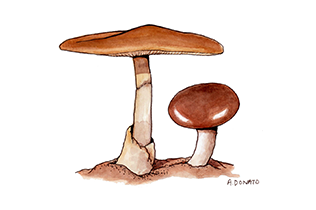
Common Names
- Active Hexose Correlated Compound
For Patients & Caregivers
Tell your healthcare providers about any dietary supplements you’re taking, such as herbs, vitamins, minerals, and natural or home remedies. This will help them manage your care and keep you safe.
Active Hexose Correlated Compound (AHCC) is a group of chemicals that are taken from fungi, like mushrooms, and turned into a supplement. People take this supplement to help their immune system.
AHCC is taken to:
- Treat cancer
- Treat infections
- Improve liver function
While AHCC is used for these reasons, there isn’t enough research to say that it works. Talk with your healthcare provider before taking AHCC.
Herbal supplements can interact with some medications and affect how they work. For more information, read the “What else do I need to know?” section below.
Side effects reported in a clinical study included:
- Diarrhea (loose or watery bowel movements)
- Mild itching
- Talk to your doctor if you’re taking doxorubicin (Lipodox®) and ondansetron (Zuplenz) as part of your cancer treatment. AHCC may decrease the effects of these medications.
-
Talk to your doctor if you’re taking aromatase inhibitors. AHCC can reduce their activity.
Aromatase inhibitors are medications that stop an enzyme called aromatase from changing hormones into estrogen. Examples of aromatase inhibitors include letrozole (Femara ®) and anastrozole (Arimidex).
For Healthcare Professionals
Active hexose correlated compound (AHCC) is a proprietary extract derived from the mycelia of shiitake (Lentinus edodes) mushrooms. It is rich in alpha-1,4-glucan oligosaccharides that are thought to enhance its biological effects (5). Patients use AHCC to prevent and treat cancer.
AHCC showed anti-inflammatory (20) and anticancer effects (7) (8) (9) (29) (22), enhanced resistance to microbial infections (3) (4), and may protect against oxidative stress-induced disorders (1). In healthy adults, AHCC improved T-cell immune responses (19), increased dendritic cell number and function (6), improved antibody response to influenza vaccine (21), and when used with Bifidobacterium longum, modulated T regulatory and dendritic cell phenotypes to favor anti-inflammatory responses after antibiotic use (30). AHCC was also effective against persistent high-risk human papillomavirus (HPV) infections (35).
Preliminary findings suggest that AHCC may improve prognosis and prevent recurrence after curative resection of hepatocellular carcinoma (10) (31), improve nutritional status when given during neoadjuvant therapy (32) (33), and reduce chemo-associated adverse effects (23) (25) (34). However, in an open-label multicenter study of patients with early stage prostate cancer, AHCC was ineffective in reducing prostate-specific antigen levels by 50% or more (11). Further research is needed to determine the therapeutic potential of this extract.
- Cancer
- Infections
- Liver function
AHCC glucans are low molecular weight (~5 KDa) polysaccharides with alpha-1,3 linkages. Both properties are unusual for this class of compounds with reported immunomodulatory properties (7). Proposed mechanisms include orchestrating immune responses and maintaining immune homeostasis in part by priming TLR-2 and TLR-4 (toll-like receptor) gates at the intestinal epithelium (24).
AHCC enhanced natural killer cell activity to induce endogenous IL-12 in mice (8), improved murine response to influenza infection (15), increased resistance to West Nile virus by improving T-cell response (16), and increased resistance to bacterial infection (3) likely via increasing inflammatory cytokine and chemokine expression as well as lymphocytes (13).
In healthy adults, AHCC enhanced CD4+ and CD8+ T-cell immune responses (19). In patients with hepatocellular carcinoma and cirrhosis, beneficial effects on liver function (10) are thought to be via regulation of nitric oxide production (14).
AHCC also enhanced antitumor effects of 5-fluorouracil by enhancing apoptosis, upregulating expression of BCl-2 associated X protein, and by downregulating B cell lymphoma 2 (26). Proposed mechanisms for overcoming drug resistance in cancer cells include downregulation of Heat Shock Factor 1, which induces heat shock protein HSP27, known to be involved in gemcitabine resistance (27).
- Diarrhea and itching were reported in a clinical trial (11).
CYP450 substrates: AHCC induces CYP2D6, which may decrease the activity of substrate drugs such as doxorubicin or ondansetron. Clinical significance is not known (12).
Aromatase inhibitors: AHCC induces aromatase and may reduce activity of aromatase inhibitor drugs such as letrozole. Clinical relevance has not been determined (28).